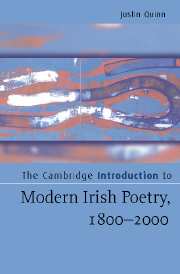Book contents
- Frontmatter
- Contents
- Acknowledgements
- Introduction
- 1 The appearance of Ireland
- 2 Tennyson's Ireland
- 3 Revival
- 4 W. B. Yeats
- 5 Wild earth
- 6 The ends of Modernism: Kinsella and Irish experiment
- 7 Ireland's Empire
- 8 Seamus Heaney
- 9 Irsko po Polsku: poetry and translation
- 10 Feminism and Irish poetry
- 11 Out of Ireland: Muldoon and other émigrés
- 12 The disappearance of Ireland
- Notes
- Guide to further reading
- Index
3 - Revival
Published online by Cambridge University Press: 05 June 2012
- Frontmatter
- Contents
- Acknowledgements
- Introduction
- 1 The appearance of Ireland
- 2 Tennyson's Ireland
- 3 Revival
- 4 W. B. Yeats
- 5 Wild earth
- 6 The ends of Modernism: Kinsella and Irish experiment
- 7 Ireland's Empire
- 8 Seamus Heaney
- 9 Irsko po Polsku: poetry and translation
- 10 Feminism and Irish poetry
- 11 Out of Ireland: Muldoon and other émigrés
- 12 The disappearance of Ireland
- Notes
- Guide to further reading
- Index
Summary
The two decades between 1890 and 1910 were not very eventful in Anglophone poetry. After the magnificent achievement of the Romantics, with Tennyson and Arnold in their wake, English poetry was guttering in the fin de siècle (Thomas Hardy would publish his first collection of poetry as late as 1898). As for matters Stateside, Walt Whitman had died in 1891, his reputation still not firmly established in his native land, and the extent and significance of Emily Dickinson's poetry had yet to be discovered: this left a clear stage for lesser lights such as Edgar Lee Masters and Edwin Arlington Robinson. Thus when a young, talented American poet looked around him for exemplars in 1908, he turned to French poetry, not English, so that he could explore new structures and themes. The poet was T. S. Eliot, and, along with Ezra Pound, he would become a leading exponent of what is loosely referred to as Modernist poetry. This work was formally experimental and intellectually demanding: poetic voice was fragmented and often macaronic; the poems ranged widely in European cultural history, and often farther afield; many readers felt that their chaotic structures reflected the confusions of the age, especially in the period after the Great War.
Pound remarked about this period of innovation, ‘[t]o break the pentameter, that was the first heave’, and this gives some idea of the disruption that Modernist poetry entailed.
- Type
- Chapter
- Information
- Publisher: Cambridge University PressPrint publication year: 2008

